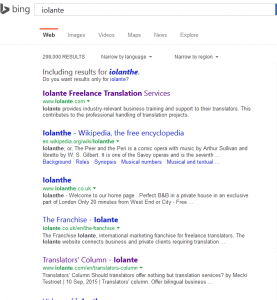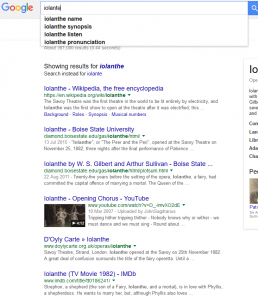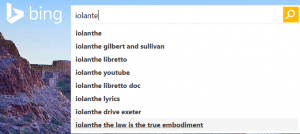How even Google can get it wrong
Having chosen the outlandish name “Iolante” with the original Greek spelling, I have become exasperated at Google over the past 15 months.
Google insists that it is much cleverer than its users. If you put in a word they think you have misspelled, Google refuses to give you the results for the word you searched for. They will change the spelling to what they think is correct and give you those results. That means, if you put in “Iolante” you get the results for “Iolanthe”. Which means there is not a single “Iolante” on the first page, despite the fact that “Iolante” has been position one, page one on Google for months. I find that annoying and patronising.
So, today I conducted a small experiment, because I wanted to know how other search engines handle “Iolante”. I tried the five most popular search engines.
1 Google
Google redirects users searching for “Iolante” to “Iolanthe”. On the first results page Google fails to display a single reference to “Iolante”. To find “Iolante”, users have to click on the option at the top of the page: “Search instead for iolante“.
2 Bing
When typing in “Iolante”, a drop-down menu appears with other spelling options (including “Iolanthe”). But if you click the return button, hey presto, you get the search results you asked for, namely “Iolante” (position one, page one). Followed by a number of “Iolanthe” links and more “Iolante” pages.
3 Yahoo
Searching for “Iolante” produces similar results to those of Bing. A drop-down menu with options appears. Clicking on the search button comes up with results for “Iolante”. Exactly what the user asked for.
At the top of the page, Yahoo informs the user that they have included results for “Iolanthe” (fair enough). Furthermore the user is given the option to “search only for Iolante”.
I call that good customer service. The client is given what he asks for but offered more if he’s interested.
4 Ask.com:
The search for “Iolante” results in a full page of nothing but Iolante-related pages without any reference to “Iolanthe”, apart from the ads and a word reference to “Iolanthe”.
Users are politely asked whether they meant to search for “Iolanthe” but not redirected by default.
5 AOL.com
Shows the same results as in Google. Nannying the user.
So what’s the bottom line?
Google may be right in suspecting that a lot of typing errors occur when putting search words into a search engine. They are wrong though in assuming that no one in their right mind would search for words that are simply spelled differently.They ought to take into account that there are often many different (correct) alternative spellings for names in particular.
Google may be the most popular search engine in the world. However, that does not give them the right to use these bullying tactics. Full marks to Bing and Yahoo for offering choices without forcing them on the user.


